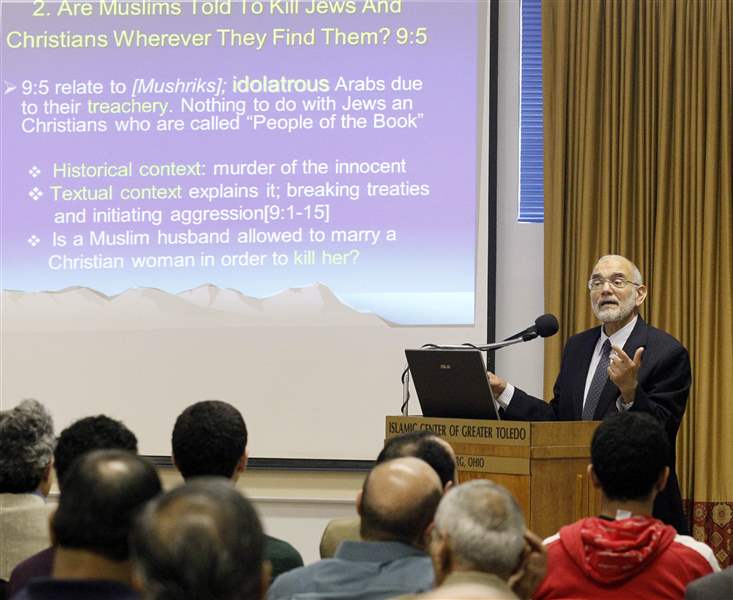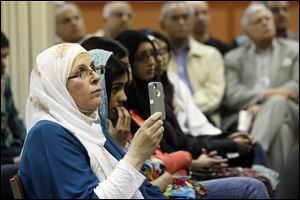
U.S. system under no threat from Sharia law, scholar says
Imam, author addresses Islamic center
3/26/2012
Jamal Badawi, professor emeritus at St. Mary’s University in Nova Scotia, speaks on Sharia law, the Islamic religious code. He said it focuses on broad applications for ethical orientation and values.
The Blade/Amy E. Voigt
Buy This Image

Jamal Badawi, professor emeritus at St. Mary’s University in Nova Scotia, speaks on Sharia law, the Islamic religious code. He said it focuses on broad applications for ethical orientation and values.
A prominent Muslim scholar, speaking at a Perrysburg mosque over the weekend, said the more than 20 U.S. states that have debated legislation barring judges from consulting “foreign laws” have been swept up in “Sharia hysteria.”
There is no way Sharia law, or the Islamic legal code, could influence the American judicial system unless it were enacted through the democratic process, and that’s not possible with Muslims making up about 3 percent of the population, Jamal Badawi said.
“That is a decision of the people, not a decision of a small minority.
“It is a question of accommodation and respect of the diversity of this country on which it was built,” said Mr. Badawi, an imam, author, and professor emeritus at St. Mary’s University in Nova Scotia, Canada, who holds a doctorate from Indiana University.
He is a member of the Islamic Juridical Council of North America, the European Council of Fatwa and Research, and the International Union of Islamic Scholars.
Speaking to 275 people at the Islamic Center of Greater Toledo on Saturday evening, Mr. Badawi compared fears that Sharia law will creep into the American secular court system to fears of Martians attacking Earth.
“Some people just have this hysteria that Sharia is something coming from Mars to destroy us. ‘The Martians are coming!’” Mr. Badawi said. “It’s a big myth. It’s a scare tactic.”
In reality, he said, Sharia is a religious code that Muslims follow, based on divine revelation from God, or Allah, to the Prophet Muhammad.
It focuses on broad applications for ethical orientation and values, with few specific rules.
“It is comprehensive and includes worship, moral, social, economic, and political aspects of Islamic living,” Mr. Badawi said.

Toledoan Ghada Elkhatib records Jamal Badawi’s presentation. He said during a question-and-answer session that abuses of Sharia law in some countries give the world a distorted view of the code.
When Sharia law addresses deterrents and punishment for crime, it requires “stringent rules of evidence” and also leaves room for compassion, he said.
Most criticism of Sharia law is based on interpretations, “unfair application, outright violations, or other historical issues” involving the legal code, Mr. Badawi said.
He cited recent news reports from Morocco about a teenage rape victim who committed suicide after her father said a judge would order her to marry the rapist.
Morocco is ruled by secular courts, not Sharia law, Mr. Badawi said, and there is nothing in Sharia law that would lead to the punishment of a rape victim. The only person who would be punished is the rapist, he said.
During a question-and-answer session, Mr. Badawi said abuses of Sharia law in some countries give the world a distorted view of the Islamic legal code.
He denounced the way leaders of Saudi Arabia, for example, “get away with stealing billions” of dollars while petty thieves’ hands are cut off as punishment for stealing.
Mr. Badawi also spoke at the Perrysburg mosque on Sunday afternoon on the topic of “Misconceptions About Islam.”
Contact David Yonke at: dyonke@theblade.com or 419-724-6154.